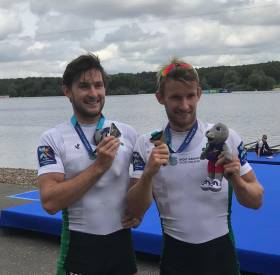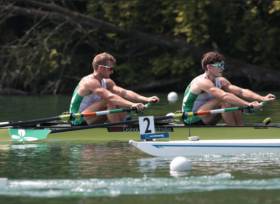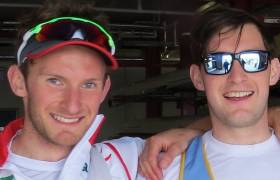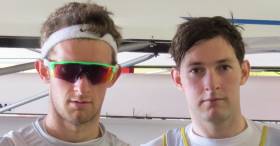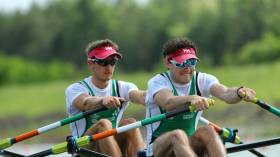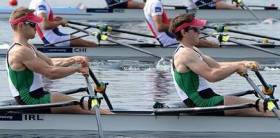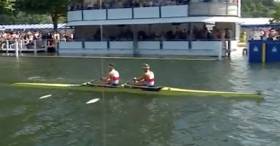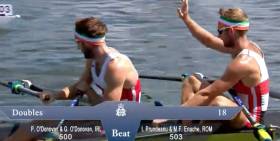Displaying items by tag: Gary O'Donovan
Paul O'Donovan and Gary O'Donovan Afloat Rowers of the Month
#Rowers of the Month: Paul O’Donovan and Gary O’Donovan are the Afloat Rowers of the Month for July. This may have been the busiest month ever for Irish rowing. There were a string of outstanding performances during a frenetic month at the National Rowing Centre. At the huge Irish Championships, Commercial took their third consecutive senior eights title in a nail-biting race; the Home International saw the Ireland senior men’s team win for the first time this century; the Coupe de la Jeunesse provided a platform for the class of Odhran Donaghy and Nathan Timoney and Aoibhinn Keating and Molly Curry as well as the junior men’s coxed four.
The World Under-23 Championships in Poznan provided rivals for the O’Donovans in terms of July winners. Four Ireland crews reached finals and the lightweight quadruple took silver. David O’Malley and Shane Mulvaney raced to gold in the lightweight pair, a fitting reward for this talented duo.
Sanita Puspure also had a brilliant July. She took silver at the World Cup Regatta in Lucerne, just a few feet away from catching the World Champion, Jeannine Gmelin.
But one Ireland crew took gold at the Rotsee. Gary and Paul O’Donovan had started the month by reaching the final of the Double Sculls on their first competitive visit to Henley Royal Regatta. In the early days of August they would take a silver medal at the European Championships. But the golden moment came at the lake of the gods, Lucerne. The Skibbereen men are the Afloat Rowers of the Month for July.
Rower of the Month awards: The judging panel is made up of Liam Gorman, rowing correspondent of The Irish Times and David O'Brien, Editor of Afloat magazine. Monthly awards for achievements during the year will appear on afloat.ie. Keep a monthly eye on progress and watch our 2018 champions list grow.
Ireland Name Big Team for World Rowing Championships
#Rowing: Seven Ireland crews have been chosen for the World Rowing Championships in Plovdiv, Bulgaria, from September 9th to 16th. There are four women’s crews, headed by Sanita Puspure in a single scull. Aifric Keogh and Emily Hegarty will compete in a pair and Monika Dukarska and Aileen Crowley in a double. The lightweight double of Aoife Casey and Denise Walsh, which competed at the European Championships, go forward.
European silver medallists Paul and Gary O’Donovan will compete in Bulgaria, while there is a heavyweight double of Ronan Byrne and Philip Doyle, which will be competing together at this level for the first time. The heavyweight pair of Mark O’Donovan and Shane O’Driscoll which finished 11th at the European Championships will compete in Plovdiv.
Another crew may be added to the team this week.
Ireland Team for World Rowing Championships, Plovdiv, Bulgaria, September 9th to 16th:
Men
Pair: M O’Donovan, S O’Driscoll
Double Sculls: Ronan Byrne, Philip Doyle
Lightweight Double Sculls: Gary O’Donovan, Paul O’Donovan
Women
Pair: Aifric Keogh, Emily Hegarty
Double Sculls: Monika Dukarska, Aileen Crowley
Lightweight Double Sculls: Aoife Casey, Denise Walsh
Single Sculls: Sanita Puspure
Other crews may be added
O'Donovans Come out on Top in Tight European Rowing Semi-Final
#Rowing: Paul O’Donovan and Gary O’Donovan won an extremely close semi-final to qualify for the A Final of the lightweight double sculls at the European Rowing Championships in Strathclyde in Scotland this morning.
Poland and the Czech Republic were the leaders to halfway. By 1500 metres, Ireland were in the lead. But Poland, Britain, Belgium and the Czech Republic were within a boat length of them. Belgium provided the best test for the Irish and took second, with Poland pipping Britain – by .22 of a second – for the third and final qualification place.
In the other semi-final, France missed out as Norway took first, Italy second and the Ukraine a surprise third.
European Championships, Day Three, Strathclyde, Scotland (Irish interest)
Men
Pair – B Final (Places 7 to 12): Britain 6:36.77; 5 Ireland (M O’Donovan, S O’Driscoll) 6:44.58.
Lightweight Double Sculls – Semi-Final Two (First Three to A Final; rest to B Final): 1 Ireland (G O’Donovan, P O’Donovan) 6:28.14, 2 Belgium 6:28.68, 3 Poland 6:29.27.
#Rowing: Paul O’Donovan and Gary O’Donovan won their heat of the lightweight double sculls to qualify confidently for the A/B semi-finals at the European Championships in Strathclyde. France, with Pierre Houin in the stroke seat and Thomas Baroukh in the bow, gave Ireland a good race. It was clear by the 1500 metre mark that these two crews were set for the semi-finals, but France would not let Ireland gain a clearwater lead. At 1750 metres the O’Donovans moved from two-thirds of a length to one length, but France stayed nipping at the lead to the line.
European Rowing Championships, Strathclyde, Scotland (Day One, Irish interest)
Men
Pair – Heat Three (First Two to A/B Semi-Finals, rest to Repechage): 1 Belarus 6:37.38, 2 Britain 6:37.76; 4 Ireland (M O’Donovan, S O’Driscoll) 6:48.94.
Lightweight Double Sculls – Heat Three (First Two to A/B Semi-Finals; rest to Repechage): 1 Ireland (G O’Donovan, P O’Donovan) 6:27.99, 2 France 6:29.83.
Women
Lightweight Double Sculls – Heat One (Winner to A Final; rest to Repechage): 1 Poland 7:08.54; 4 Ireland (A Casey, D Walsh) 7:22.02.
Gold for O'Donovans at World Cup Regatta in Lucerne
#Rowing: Paul and Gary O’Donovan took gold at the World Cup Regatta in Lucerne this morning. Denmark and Belgium had good starts, but the Skibbereen men too over the lead after 800 metres. They held it from there, though Belgium pushed right up on them in the final quarter. The O’Donovans held them off to win by .8 of a second.
World Cup Regatta, Lucerne, Day Three (Selected Results; Irish interest)
Men
Pair – B Final (Places 7 to 12): 1 Spain Two 6:40.42; 3 Ireland (M O’Donovan, S O’Driscoll) 6:43.27.
Lightweight Double Sculls – A Final: 1 Ireland (G O’Donovan, P O’Donovan) 6:28.50, 2 Belgium 6:29.30, 3 Denmark 6:32.39.
Women
Pair – B Final: 1 Spain 7:25.23; 4 Ireland (A Keogh, T Hanlon) 7:32.46.
Double – B Final: 1 Czech Republic 7:05.30; 3 Ireland (M Dukarska, A Crowley) 7:06.92.
Good Win for O'Donovans Lifts Them Into A Final at Lucerne
#Rowing: The race was a tight one, but Paul O’Donovan and Gary O’Donovan won their semi-final of the lightweight double sculls to take their place in the A Final tomorrow at the World Cup Regatta in Lucerne.
The Ireland crew took over from early leaders Denmark, who took second, while Canada beat Britain One for the final qualification spot.
World Cup Regatta, Lucerne, Day Two (Irish interest; selected results)
Men
Pair – A/B Semi-Final One (First Three to A Final; rest to B Final): 1 Serbia 6:33.87, 2 Spain 6:36.65, 3 Britain One 6:38.90; 4 Ireland (M O’Donovan, S O’Driscoll) 6:42.02.
D Final (Places 19 to 24): 1 Poland 6:40.95; 5 Ireland (P Boomer, A Harrington) 6:53.83.
Lightweight Double Sculls – A/B Semi-Final One (First Three to A Final; rest to B Final): 1 Ireland (G O’Donovan, P O’Donovan) 6:19.05, 2 Denmark 6:20.03, 3 Canada 6:20.52.
Single Sculls – C Final (Places 13 to 18): 1 Australia 6:58.52, 2 Argentina 6:59.65, 3 Ireland (P Doyle) 7:00.39.
Women
Pair - Repechage (First Two to A Final; rest to B Final): 1 Australia 7:18.62, 2 China One 7:19.86; 4 Ireland (A Keogh, T Hanlon) 7:29.63.
Double – Semi-Final (First Three to A Final; rest to B Final): 1 New Zealand 6:53.91, 2 Canada 6:57.71, 3 Netherlands 6:58.57; 4 Ireland (A Crowley, M Dukarska) 7:06.42.
#Rowing: Paul O’Donovan and Gary O’Donovan won their heat to qualify directly for the semi-finals at the World Cup Regatta in Lucerne. The Ireland lightweight double scull took the lead from the start. They led Poland at halfway, but the Poles, who beat Ireland in the first World Cup in Belgrade, then took over. Austria pushed into the top three and these boats fought it out for two places. Ireland showed they had the speed in the dash to the line – and it was Poland who lost out, taking third.
Philip Doyle qualified for the quarter-finals of the single sculls with third place in his heat. Mahe Drysdale, the Olympic champion, was the likely winner, but Doyle led through the 500 metre mark. The big New Zealander took over and won. Sverri Nielsen of Denmark took second and Doyle was just behind him.
World Cup Regatta, Lucerne, Day One (Irish interest; selected results)
Men
Pair – Heat Two (First Four to Quarter-Final; rest to Quarter-Final or E Final): 1 Spain 6:40.29; 3 Ireland Two (P Boomer, P Harrington) 6:45.74
Heat Six (First Three to Quarter-Final; rest to Quarter-Final or E Final): 1 Croatia 6:37.66, 2 Ireland One (M O’Donovan, S O’Driscoll) 6:40.95.
Lightweight Double Sculls – Heat One (First two to A/B Semi-Finals; rest to Repechage): 1 Ireland (G O’Donovan, P O’Donovan) 6:17.43, 2 Austria 6:17.79; 3 Poland 6:17.91.
Single Sculls – Heat One (First Four to Quarter-Final; rest to Quarter-Final or E Final): 1 New Zealand (M Drysdale) 6:52.98; 3 Ireland (P Doyle) 6:55.18.
Women
Pair – Heat Two (First to A Final; rest to Repechage): 1 Canada 7:13.98; 6 Ireland (A Keogh, T Hanlon) 7:32.49.
Double Sculls – Heat Two (First Three to A/B Semi-Finals; rest to Repechages): 1 United States 6:58.58, 2 Ireland (A Crowley, M Dukarska) 7:03.05.
Single Sculls – Heat One (First to A/B Semi-Final; rest to Repechages): 1 Ireland (S Puspure) 7:26.51; 2 United States 7:40.98.
O'Donovans Head for Lucerne as Afloat Rowers of Month
#Rowers of the Month: Paul O’Donovan and Gary O’Donovan are the Afloat rowers of the month for June. Both brothers showed outstanding form at Cork Regatta. Paul O’Donovan won the single sculls. In the heats, Gary had not been the next fastest, but come the final the elder O’Donovan brother was second only to Paul. The two raced in the double, where they were tested by Fintan and Jake McCarthy, but came through with the win.
The O’Donovans were run close by David O’Malley and Shane Mulvaney. The UCD pair were outstanding at Cork Regatta. They won the pairs title, beating world lightweight champions Shane O’Driscoll and Mark O’Donovan, and they slotted into the UCD four which also won. O’Malley and Mulvaney form the Ireland lightweight pair in a strong team for the World Under-23 Championships this month. The O’Donovans, who went on to reach the final at Henley Royal Regatta, head for the World Cup in Lucerne next weekend (July 13th to 15th). Good luck to all those competing in this busy month.
Rower of the Month awards: The judging panel is made up of Liam Gorman, rowing correspondent of The Irish Times and David O'Brien, Editor of Afloat magazine. Monthly awards for achievements during the year will appear on afloat.ie. Keep a monthly eye on progress and watch our 2018 champions list grow.
#Rowing: Paul and Gary O’Donovan were beaten in the final of the Double Sculls Challenge Cup by Jack Beaumont and Angus Groom at Henley Royal Regatta today. The Skibbereen men blasted off the start, but the Britain heavyweight crew took an early lead. The O’Donovans came back at them but their steering was problematic and the umpire had to twice redirect them. Groom and Beaumont, rowing off the more favoured Berkshire station, went on to win by five lengths.
Henley Royal Regatta (Selected Results; Irish interest)
Double Sculls Challenge Cup (Open) – Final: A Groom, J Beaumont bt G O’Donovan, P O’Donovan 5l.
#Rowing: Paul and Gary O’Donovan won their semi-final of the Double Sculls at Henley today. The Romanian heavyweight crew of Ioan Prundeanu and Marian-Florian Enache matched the Skibbereen men in the first quarter. The race was effectively over soon after, as the Olympic lightweight silver medallists moved into a clear lead and stretched it to over four lengths. The Irish crew, wearing tricolour headbands, were cheered loudly as they passed the enclosures.
Henley Royal Regatta, Day Four (Irish interest; selected results)
Double Sculls (Open) Semi-Final: J Beaumont, A Groom bt K Brun, A Strandli ¾ l; G O’Donovan, P O’Donovan bt I Prundeanu, M-F Enache 2¼ l.


























